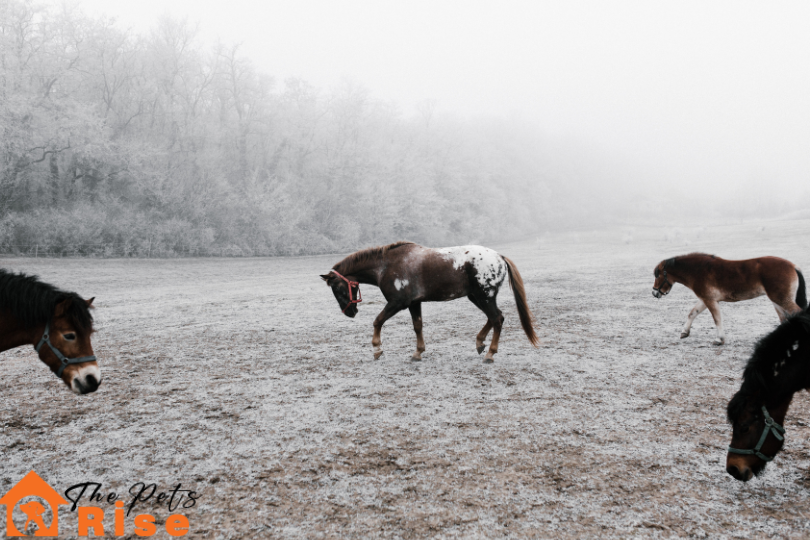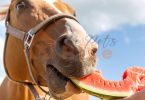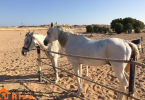Winter care for horses is one of the major topics of discussion among pet horse owners. As the winter time is coming closer, new pet horse owners are wondering if horses get cold in winter. Well, the simple answer is yes. Though they are considered tough animals but again, as living beings they can still get cold if there is prolonged exposure to the cold. This is why winter care for horses is as important as it can be for any other pet.
There are some breeds of horses that are tough enough to live in cold environments but at the end of the day, they still need warmth and shelter. However, caring for horses in winter may not be as intense as with other pets. They can still do well in the winter months. Having proper diets, water access, shelter, and exercise they can stay comfortable in the winter as well. Diet modification, ice management, and some proper amenities shouldn’t sound much of a deal when it comes to winter care for horses. Continue reading the following for more information.
Modifications of Feed
On average, a horse will need to have at least 2% of its body weight so its body condition will be maintained. A huge chunk of the horse diest should contain forage either pasture or hay. Some breeds of horses may need to consume less than 2% of their weight in their daily feed especially when they don’t have many physical activities. However, others such as pregnant mares, athlete horses, older horses, and breeding stallions may require upto 3% of their body weight in feed per day.
When it comes to caring for horses in winter, keep in mind that a horse of 1000 pounds, receding most of its daily feed in the hay will consume roughly 20 pounds of hay every day. In cold weather, a horse of the same weight horse will consume 25-30 pounds of hay on daily basis to keep itself warm. While feeding the horse in winter, you will need to keep in mind his body level, activity level, and what the nutritionist has suggested about the feed for the horses in winter.
When it comes to fiber digestion then it is an important way through which horses keep themselves warm in winter. While you can opt for horse snow pads, the fiber in the diet should also be included in their feeding. This is because the fiber in the horse’s diet (hay or grass) helps in producing heat in the body through digestion. Another part of keeping horses warm in winter, especially in bad snowy weather is to feed them extra hay meals frequently to make sure that he is eating enough fiber to keep themselves warm in cold weather.
You may wonder about the calory intakes in such a situation which is somewhat right. However, there is a solution for this which is pretty easy. The keeper should buy hay that is low in nutrients, mature, and dry with no mold on it. This will provide forage but will not add extra calories. In the same way, an older horse can be fed on immature nutrient-rich, and tender hay. To provide the most benefits then you can go for alfalfa hay or alfalfa grass mix as this is more nutrient-rich than regular grass.
Watering And Minerals For Horses In Winter
While your concern regarding how to keep horses warm in winter is understandable, you shouldn’t overlook the importance of water in winter for horses as well. They require clean and fresh water that should be unfrozen and warm enough so horses can drink them easily. This is one of the most crucial parts of the routine of winter care for horses. Some carers might believe that snow can do the same for the horses which isnt true because horses cannot have enough snow that can fulfill the water requirements. The temperature of the water should be between 45 and 65 degrees Fahrenheit. The colder the water is, the more increase in energy requirement will be. This is because there will be more requirements for calorie intake to keep the body warm to according the cold temperature of the water inside the digestive tract.
If the horses are in winter drinking cold water then they may drink less than the required amount of water. With less water intake, there will be a risk of colic impaction because water keeps their gut propper lubricated.
Sheltering For Horses In Winter
When it comes to keeping horses warm in winter then sure you will need to have a proper shelter, they will still require a good outdoors as it keeps them happy. When horses remain outside in the cold outdoors, you should let them grow a thick winter coat. This beautiful, thick, and dry coat of hair will work as a great insulator and it will be their basic defense against cold temperatures.
Now comes the shelter. The shelter is also important in keeping horses warm in winter. You can go for trees and sheds with three side covers for better shelter for horses. Make sure there isnt any moisture and wind in near-zero temperatures. Horses can survive in such temperatures without wind and moisture or even Colder if there is good shelter available for them. A group of horses will stay close to each other to share body heat and sometimes they will do a brief run to warm their bodies to share it with other horses.
Providing winter blankets is another part of winter care for horses, even when they are living inside. Don’t forget to maintain the quality of air in the shelter. Keep it well-ventilated so the horse will not face any respiratory issues. Horses will face respiratory issues and heated barns when they are kept inside with poor ventilation.
Ice Management
The winter care for horses also includes cleaning the hooves where they can compile in the hooves and they will walk like wearing high heels. This isnt good for the tendon muscles and ligaments of the horse. Whenever you notice ice in the hooves during the winter remove it. Check for scratches caused by the ice or any other material.
Horses and snow aren’t very good together. Not only it can stuck in the hooves but ice around the shelter can make the area slippery as well. This can lead to some serious injuries among the horses. If there are areas around the shelter where ice can grow then keep an eye on them. Also, you can sprinkle sand on it or break it with an ice shovel to prevent slipping. You should also add a fence to it as well.
Keeping an eye on the wet areas is a good thing to do. However, voiding injuries through this should also be part of caring for horses in winter as well. Fencing off is a good practice to keep the horse out of those areas. Don’t forget to check the areas daily and check if your horse or horses has access to that area. It won’t hurt itself by slipping and falling.
Exercising While Caring For Horses In Winter
Because of the cold weather or just to give them enough time to relax after a busy show season. Several horses are given a winter vacation. Horses lose part of the learning and the level of physical fitness they have attained through working with extended vacations. To prevent a slump, here are some suggestions:
Once or twice a week, observe your horse and where it is being kept. You can groom your horse there, check their hooves and look for injuries, and assess their physical health.
As often as the weather permits, ride your horses. You can ride one and pony another if you own several horses. By doing this, two horses can start working and time can be saved.
To lower the danger of pneumonia, a fever, or diarrhea, properly cool your horse down after work. Wait until they are entirely dry before blanketing or turning them out.
Mind that your horse’s endurance may be lower in the wintertime. It is during the hot months when you were training more. Find out if non-boarders can use the amenities at nearby stables by contacting them. For a price, stables frequently let outside horses and riders use their outdoor or indoor grounds.
Bottom Line
Hope this article contains helpful information regarding winter care for horses. Knowing how to keep horses warm in winter will surely be helpful for your horses to stay active and healthy in harsh weather of winter. If you need more information regarding horse care then follow our pet care blog for more interesting and useful articles for pet care tips and tricks.







